#Political Psychology
Explore tagged Tumblr posts
Text
Survey: Voter Preference for Political Candidates (Everyone can participate)
🙏 I NEED YOUR HELP! 🙏
For the final part of my Master's degree in Political Science, I am researching voters’ preferences for political candidates. Your answer is absolutely IMPORTANT to the assignment and will mean the world to me! 😃
The questionnaire takes about 5-15 minutes, and your answer is completely ANONYMOUS. It can be completed in both English and Danish 🇬🇧🇺🇸🇩🇰
Simply answer my questionnaire by clicking on the following link: (https://survey.au.dk/LinkCollector?key=8HR6PMSMJK95).
By answering, you can participate in a lottery and win one of 4 prizes of 500 Danish crowns! (corresponding to circa 73 US dollars or 57 British pounds) 🏆
Hurry up and participate as the survey closes on April 30th 📅
Participation is fundamentally limited to people with eyesight and without color blindness 👀
Thank you so much for your help! 😊
#research#survey#online survey#student#political science#political psychology#thesis#danish#english#lottery
2 notes
·
View notes
Text
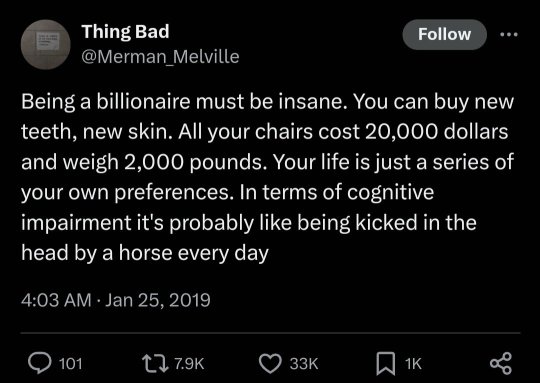

14K notes
·
View notes
Text
Unraveling the Psychology Behind Political Polarization
We've all heard the contradictory bullshit that conservatives at all levels regurgitate upon us. None of us can understand the level of cognitive dissonance necessary for it, but here are three psychology studies that will help.!
SUMMARY: The blog post delves into the psychological reasons behind why some individuals believe in seemingly unbelievable political rhetoric. It discusses the illusory truth effect, the complex relationship between anxiety and right-wing populism, and the role of envy in radicalization. The post suggests that the GOP is purposefully radicalizing its base and emphasizes the importance of…

View On WordPress
#Anti-Elitism#Anxiety#Authoritarian Submission#Christian Unkelbach#Cognitive Tom Fuckery#Diffuse Anxiety#Envy#False Memories#Felix Speckman#Illusion of Truthiness#Illusory Truth Effect#Mass Psychosis#Political Polarization#Political Psychology#Psychology#PsyPost#Radicalization#Repetition Effects#Right-Wing Populism#Situational Anxiety#Stephen Colbert#Trump#University of Cologne
1 note
·
View note
Text
Birth of the Ruderal
Nature creates fast-types and slow-types. You would think there are uppers and downers too. This is how it goes. So, I propose we call liberals changers. I do not like the terms liberals or progressive (the latter: it is not certain the change is truelly progressive or not). Changers are the rule breakers, while conservatives are the rule makers. Conservatives stabilize the system. Following Marco del Giudice, I see past orientation besides present orientation and future orientation. I also see competitive attitudes besides his cooperative and exploitative attitudes. Following Avi Tuschman, perhaps rule breakers are (more often?) outbreeders, while rule makers are (more often?) inbreeders. Following Bernard Crespi and Christopher Badcock I see a conflict between the maternal and the paternal. Is there some link between the patriarchy and this conflict?
Without natural selection, according to the Zero-Force Evolutionary Law (ZFEL), a system will complexify and diversify. Can we expect this to happen with our societies once threats are gone? I see order, disorder, edge of chaos, and chaos. Following Scott Page I see exploiters vs explorers and redundancy vs diversity. In this, redundancy is possibly conforming while diversity might be non-conforming. This seems to be about hunters (conservatives) vs busybodies (changers). Autistic people see the details, creative people the whole: what is this about?
Conservatives do not like greens: maybe they are on average more easily poisoned? It are greens which contain (light) toxins after all. Conservatives seem to have higher disgust and threat sensitivity. Perhaps they have weaker immune systems and (some of them) are not as strong. That having said, there are hints that highly attractive people and men with high upper body strength support rightwing politics. They seem poised for both dangerous and ordered environments. (However upper body strength also goes with redistribution views.)
According to Crespi and Badcock, extreme female brains and extreme male brain exist. If there is an extreme male brain, there should be an extreme male body. If so, that seems to suggest there should be an extreme male, male body and a extreme female, male body.
I also speculate how the c-s-r model fits into the framework. Not just with the paternal vs maternal model but also as fast-type vs slow-type. Both competitive and ruderal seem to be fast-type, whereas survivor seems to be slow-type. Perhaps a competitive slow-type exists. Both competitive people and ruderal people should probably have fast growth rate and also age faster. We could argue some people are born older or younger. Perhaps survivor people are tougher as according to the c-s-r model survivor plants have tougher leaves. It seems possible surivor people retain fat more, while competitive people have higher muscle growth. Perhaps survivor people have a higher pain treshold. There is probably more to the c-s-r model.
The system creates personalities, which in turn changes the system.
Next: what type of environments can we distingish and what type of personality usually comes out of it? According to the c-s-r model there are high stress + low disturbance environments, low stress + high disturbance environments, low stress + low disturbance environments. About the Inglehart–Welzel cultural map: I speculate the traditional and survival have to do with stress and disturbance. Self-expression seems to do with signalling and sexual selection. As the guppies become more colourful when they are without predation, so people can become more self-expressive when the environment is safe. I call it the peacock. Secularity is perhaps related to intelligence.
I can think of the following environments: chaotic, high stress or harsh/poor, unpredictable, rich, dangerous and ordered. So where does this lead to? Changers seem to do better in messy and/or chaotic environments. Following Dick Swaab there is rich and high stress biological context to sensitivity. Following Tim Low it seems that rich environments create aggressors. Conservatives seem to be about creating order or thriving in order.
As for the (by Jonathan Haidt) moral foundations I suggest we reduce harm to threat sensitivy, fairness stays fairness, authority to dominance, ingroup to ingroup and purity to disgust sensitivity. I am also fascinated by trade-offs and allocations. I think it needs to add flaws and errors, in which flaws are imperfections and errors are mistakes. Besides that, I wonder what to do with the terms leftwing and rightwing. How many leftwing orientations are there? How many rightwing orientations are there? What can we reduce them to? Could avoidant personality cluster with the autistic spectrum? Could dependent personality disorder cluster with the psychotic or autistic spectrum? I think dependent personality is about – following Scott Page – exploiting, while avoidant personality is about exploring.
Yaneer Bar-Yam says:
Most animals have many offspring. The number of offspring that survive to adulthood tells us something about how complex an animal’s environment is compared to its own complexity. Mammals have several to dozens of offspring, frogs have thousands, fish have millions and insects can have as many as billions. In each case, on average only one offspring per parent survives to have offspring. The others made wrong choices because the number of possible right choices is small. In this way, we can see that mammals are almost as complex as their environments, while frogs are much less complex and insects and fish are still less complex when compared with their environments.
Following the above, it seems logical that people with a lot of babies are also less complex (but I think this does not necessarily mean less intelligent).
I call schizophrenia system-failure, following the below (by Scott E. Page):
In systems with capacity constraints a tradeoff arises between redundancy and diversity. Greater diversity entails more responsiveness—think back to the law of requisite variety—but increases the odds that the failure of any one entity could cause the system to collapse. Greater redundancy implies less ability to respond to new disturbances but agreater ability to withstand the loss of any one entity in thesystem. On balance, a system must trade off redundancy with diversity much in the same way it trades off exploitation(doing what it does well) and exploration (continuing to look for something better). Redundancy guarantees that the system can keep doing what it’s doing. Diversity enables it to respondto new disturbances.
I think I might be wrong here. But I see schizophrenia as having more diversity and at a higher risk at systemfailure (collapse).
Turchin cycles
#evopsych#psychology#r-s-c model#evolutionary strategies#ruderal#competiive#systemfailure#survivor#political psychology#mental#evolutionary psychopathology#moral foundations#exploiting vs exploring#redundant vs diverse
0 notes
Text
This is the person most likely to be behind the Q intelligence contingency plan psychological operation. I saw them developing it on 4chan years ago during the time all the psychological experiments were going on there. The Q posts match the speech and analytical patterns found in her research, and her research coincides with the techniques used in the Q operation. I see and know everything. I am the 👁️ of Providence, manifested through the desperation of man and eternal alchemists in the higher and lower dimensions. Nothing happening in any dimension or behind any closed doors escapes my comprehension.

#psychology#psychological operations#Human Dimensions#research labs#forestry#wildlife#natural resources#Israel#Zionism#genocide#Palestine#Q#Qanon#intelligence#artificial intelligence#Dr. Jan#political psychology#psychoanalysis
1 note
·
View note
Text
youtube
Why we should stop focusing on our enemies
In the end, you become just like the people you hate. It's so sad that so few humans ever learn this lesson.
#narcissism of small differences#politics#political psychology#liberals#conservatives#republicans#democrats#andrew yang#Youtube
0 notes
Text
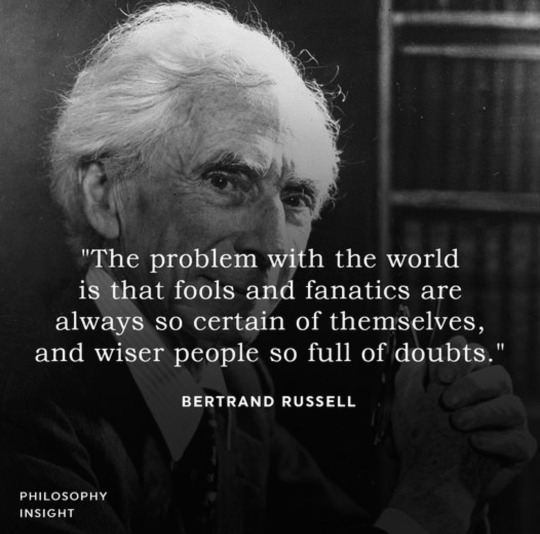
490 notes
·
View notes
Text
Insight today while washing the lettuce and thinking of my friend who doesn't want to vote.
They are an otherwise intelligent, responsible, generous person, who appears to be socially conscious. They have worked hard and long for their position in their profession. They express concern for the planet. They get twitchy if you use too many paper towels.
But they don’t want to vote for Biden for reasons, and quote "doesn't like the whole system where the parties take turns swinging things back and forth" unquote.
I have been dumbstruck at their attitude for about two months now. I've been thrashing back and forth trying to reconcile this person I love with their attitude:
If you care abt the planet enough to conserve paper towels, don’t you care enough to stop a Repub administration from raping the land?
If you don’t like how things can swing back and forth, don't you want an administration that's going to work to shore up, rather than dismantle, more lasting democratic systems of governance?
If you understand the value of the long game, why are you only satisfied with instant results from a single election rather than viewing that election as a single move in an ongoing process?
The insight came to me as I used an extra set of paper towels to dry my lettuce:
These people are not motivated by outcomes. They are motivated by how their choices make them FEEL.
Not how the outcomes of their choices will make them feel. But how the action associated with their choices makes them feel.
In terms of outcomes for the environment, saving paper towels doesn't do shit compared to pushing for restrictions on oil companies. But using half a paper towel is an instant dopamine hit: "Ahhh, I am caring for Mother Earth. I care. I am a good person. Ahh yes that's the stuff."
This model fits for voting too. We know that The Only Votes That Count Are Those Cast. We know that Dems Go Where The Votes Are Not Where The Votes Aren't. We know that voting in every election, every time, in numbers, is a very low-effort way to contribute to moving the Overton window farther left.
But in the moment, for people who are motivated by how their action associated with their choice makes them feel... the absolute best move for their dopamine supply is to abstain: "I am NOT supporting an old fart; I am NOT supporting genocide; I am Challenging The System; I am a good person. Ahh yes, that's the stuff."
At the time, when I challenged my friend on their position, they held up their hands and said "look, I'm not saying I have any answers, I'm just saying I don’t like how the system works."
They didn't like how participating in the system made them FEEL in the moment.
For those of us who think this is madness, hey, we aren't off the hook entirely. We are basing our choices and actions off of outcomes, true. But there's probably a feeling/dopamine component in there too. "I am holding my nose and voting Blue; I am doing my part to actually affect the future even if I hate some things abt my choice; I am a good person. Ahh yes, that's the stuff."
So maybe the difference isn't in the motivation (my feelings and self-image) but in what motivates us (my action vs the outcome of my action).
I don't have an answer to the question at this time and this post is already long enough. But I'll think on it. And I invite you to do so as well:
For these people (who seem to be a sizable part of the population), how to outweigh the choice where their action preserves their self-image, doesn't cost them dopamine for having to take a "bad" action, and maybe even gives them a happy boost for "not being part of a flawed system?"
For these people, how to help them connect more to the outcome?
Off the cuff, I can't think of any means other than cognitive-behavioral therapy. :/
EDIT: Apparently there's a term for this and it's called Emotivism -- ethics isn't abt effects but abt feelings.
990 notes
·
View notes
Text
The opposite of courage in our society is not cowardice, it's conformity.
Rollo May
426 notes
·
View notes
Text
Survey: Voter Preference for Political Candidates (Everyone can participate)
🙏 I NEED YOUR HELP! 🙏
For the final part of my Master's degree in Political Science, I am researching voters’ preferences for political candidates. Your answer is absolutely IMPORTANT to the assignment and will mean the world to me! 😃
The questionnaire takes about 5-15 minutes, and your answer is completely ANONYMOUS. It can be completed in both English and Danish 🇺🇸🇬🇧🇩🇰
Simply answer my questionnaire by clicking on the following link: (https://survey.au.dk/LinkCollector?key=8HR6PMSMJK95).
By answering, you can participate in a lottery and win one of 4 prizes of 500 Danish crowns! (corresponding to circa 73 US dollars or 57 British pounds) 🏆
Hurry up and participate as the survey closes on April 30th 📅
Participation is fundamentally limited to people with eyesight and without color blindness 👀
Thank you so much for your help! 😊
2 notes
·
View notes
Text
People on the side of The People always ended up disappointed, in any case. They found that The People tended not to be grateful or appreciative or forward-thinking or obedient. The People tended to be small-minded and conservative and not very clever and were even distrustful of cleverness. And so, the children of the revolution were faced with the age-old problem: it wasn't that you had the wrong kind of government, which was obvious, but that you had the wrong kind of people.
As soon as you saw people as things to be measured, they didn't measure up.
Terry Pratchett, Night Watch
#sam vimes#samuel vimes#night watch#lord snapcase#discworld#terry pratchett#revolution#politics#government#social reform#revolutionary#the people#people#psychology#clever#suspicious minds#human nature#group dynamics#the age-old problem#the wrong kind of people
1K notes
·
View notes
Text
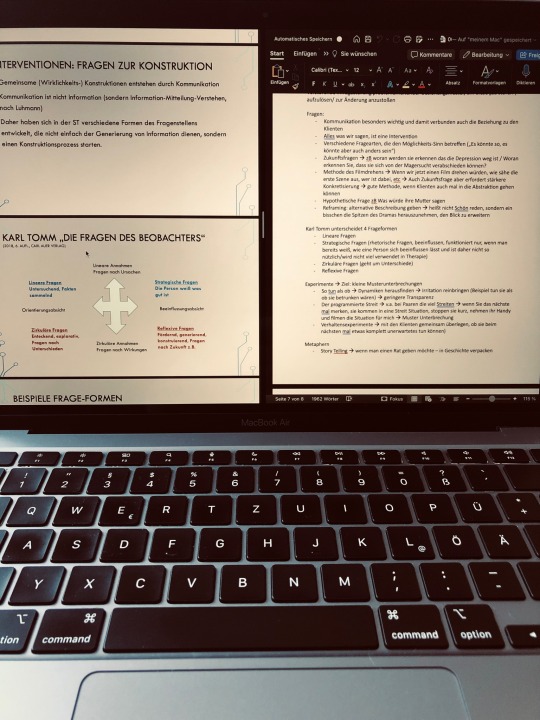
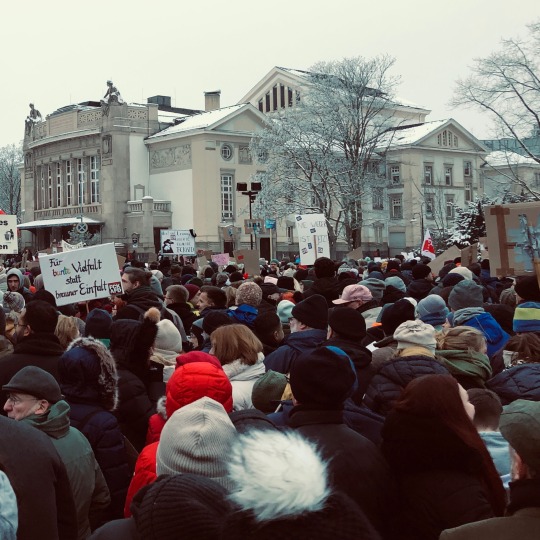
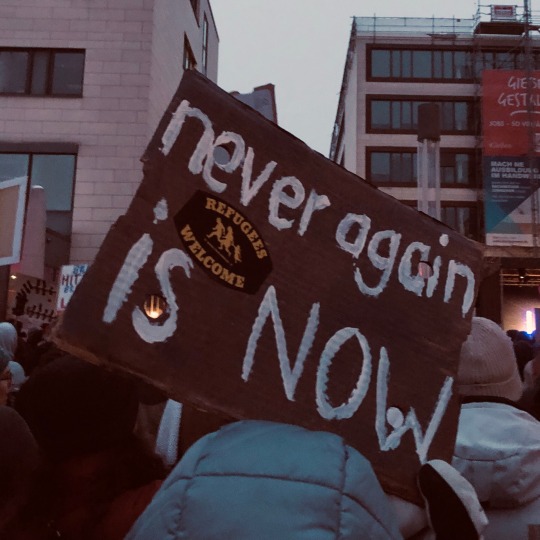

21.01.24
Due to events that were recently uncovered, there have been protests all across Germany against fascism, a particular right-wing party and right-wing extremism in general.
These kinds of right-wing movements have been on the rise not only in my own country, but all over Europe. It often leaves me feeling helpless, like a passive bystander, only watching things go downhill without any chance to do something about it.
That's why it has made me very happy and proud to see so many people in my country standing up against it these past days. I think it's so important to just stand up, go outside and be loud about it. Simply to show up. We can not let these terrible people have the stage, we can not let them lead the narrative. They are not Germany. We are.
#ganz deutschland hasst die afd#mine#personal#antifascist#politics#germany#protest#diary#studyblr#psychology#psych studyblr#dark academia aesthetic#chaotic academia#romantic academia#dark academia
514 notes
·
View notes
Text
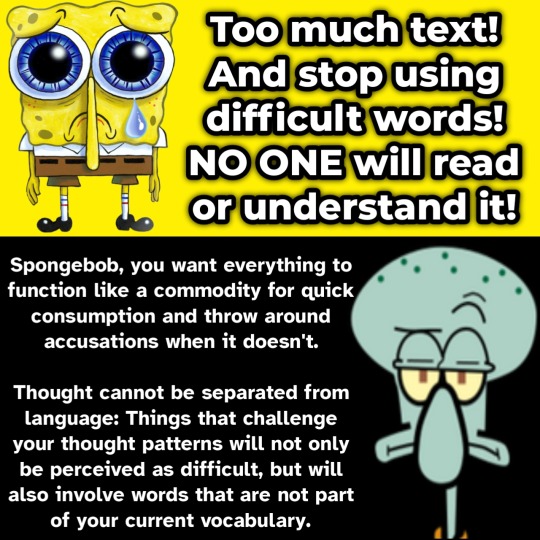
Squidward understands that language is political and that we therefore need to break away from the status quo in the way we speak when we aim to resist the status quo
#philosophy#sociology#socialism#communism#politics#psychology#squidward#spongebob#spongebon squarepants#theory#memes#language
79 notes
·
View notes
Text
Everything we said about the Biden family's corruption in Ukraine has been confirmed by congression

here you can find out more detailed information
344 notes
·
View notes
Text
One thing that struck me when I read the reports from the foreign healthcare worker in Gaza: “The nurse begged me to send in a psychiatrist.”
The children and adults that are healthy and relatively okay…are absolutely not okay.
“The little girl was just cradling and rambling in the corner and singing a lullaby to herself.”
NYTimes, who are famously very Zionist, reported this.
#psychology#gaza#israel#nyt#doctors#nyt journalism#democrats#republicans#politics#woc#books#news#donald trump#poc#Horror
118 notes
·
View notes
Text
I'm trying to redirect my political thoughts from my fandom escape blog again, but I found something interesting enough that I thought I'd talk a little about it.
Occasionally I choose suffering (looking at the more granular 2024 exit poll breakdowns rather than the summaries that I mostly don't trust much at this point). Anyway, I did find something intriguing, if not particularly surprising, in the CNN exit polls, which were done in Arizona, Florida, Georgia, Michigan, Nevada, North Carolina, Ohio, Pennsylvania, Texas, and Wisconsin with a sample size of 22,914 voters.
(I mention the specific states forming the sample because this pretty notably excludes any blue states while including some reliably Republican ones.)
Anyway, most exit polls including CNN's let respondents identify their place on the US political spectrum: conservative, moderate, or liberal (reminder that "liberal" in US usage can be a pejorative for "less leftist than me" but also a shorthand for "radical leftist" but also for "anyone who doesn't seek a cishet white Christian ethnostate", but also can be a more neutral synonym for progressives and/or leftists and is often used that way, as here). So you can look at the election results for each of these ideological factions and what share of the overall sample size they represent.
The interesting thing: this "liberal" category accounted for very similar proportions to 2020 of the overall vote in the sample (24% in 2020, 23% in 2024—a difference well within the margin of error of exit polling). There is no need to explain liberals/leftists staying home in 2024: at least in terms of proportions of the overall electorate, they didn't. Just under 1/4 of voters in 2024 were liberals or leftists, just as in 2020.
Okay, if the most leftwards faction of the US political spectrum actually formed a similar proportion of the electorate, then who did they vote for?
Harris. In CNN's own exit polls from 2020, 89% of this faction voted for Biden, and (surprisingly!) a full 10% voted for Trump. God knows what motivated that 10% Trump share after four years of his hellscape of an administration at the height of COVID, but in any case, that support cratered in 2024. 91% of this group voted for Harris and only 4% for Trump. It's an estimate, but it looks like these very peculiar Trump voters had enough of him in 2024 and around half either voted third party this time or for Harris.
So which faction is Trump's victory coming from? Further consolidation of the far right?
In part, yes! 90% of conservatives voted for Trump in 2024, vs 85% in 2020—likely, some conservatives who voted third party or even for Biden in 2020 came "home" this year. However, conservative turnout was actually a little down in 2024, proportionally speaking: conservatives dropped from 38% of the sample in 2020 to 34% in 2024.
But there's one more major faction in all this: "moderates" or centrists. To be clear, we're talking about the US version of centrism, given that this is a US organization polling US voters about US politicians, not "Bernie would be center-right in Denmark" or whatever. This moderate faction jumped from 38% of the overall sample in 2020 to 42% in 2024, and they swung hard towards Trump, though Harris still won a plurality of them. In 2020, 64% of moderates voted for Biden vs 34% for Trump. In 2024, 57% of them voted for Harris vs 40% for Trump—that is, the Democratic lead among centrists dropped precipitously from +30 to +17.
Tl;dr—ideologically speaking, this data suggests that Trump owes his victory to gains among both right-wing and centrist voters rather than some faction of would-be leftists or progressives apathetically staying home or voting third-party or otherwise deserting Democrats (because they're insufficiently radical or for any other reason).
Oh, and if you're curious as to how this compares to CNN's 2016 exit polls, I also checked those! Harris's 84-point lead among the most leftwards faction is a significant improvement from HRC's 74-point lead in 2016. Trump also got 10% of that group in 2016, as in 2020, so it's this campaign—not Hillary's or Biden's—that managed to eat into whatever the hell is going on with that group.
Harris's +17 with moderates is actually a slight improvement on Hillary's +12 in 2016. Biden's jump to a +30 lead among centrists in 2020 represented either a backlash against Trump from centrists, or Biden's own rapport with that group, or some mysterious issue some of those voters had with both HRC and Harris (I wonder what it could be!!), or some combination thereof. Regardless, there are a lot of actual ideologically centrist voters in the USA and not just would-be leftists who haven't heard the good news of Marx yet. And Trump has an iron grip on the right wing at this point: he beat Hillary with conservatives by +65 in 2016, then beat Biden with an even larger margin of +71, then leapt to a 81-point lead over Harris with right-wing voters this year.
#at some point the usa's left (which includes me! to be clear) is going to have engage with the basic reality#that centrists and conservatives really truly exist and vastly outnumber us and genuinely hold socioeconomic beliefs#that are largely antithetical to our own#voters who listed economic concerns as their top priority voted 80-19 for trump#some /are/ persuadable and others will swing against whoever the incumbent is regardless of policy#but fundamentally they don't agree with us. they really truly think republican policies are good for the economy#we need to stop pretending that we're dealing with different and more psychologically comforting problems than we actually have#maybe it's bc i have to endure a lot of centrist nonsense irl that the way a lot of other progressives talk about them frustrates me#but so many refuse to believe that we're not a silent majority. the flat refusal to leave that fantasyland is exhausting tbh#anghraine babbles#long post#cw politics#us american blogging#election night hell 2024#anghraine rants#mostly for the tags
60 notes
·
View notes